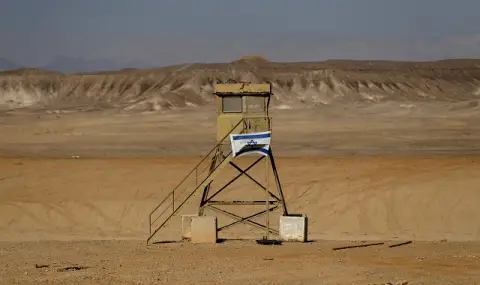Israel seems increasingly pushed to the wall. This is the result of a government that has given up any diplomacy and whose fate seems to be more important than the well-being of the state, writes ARD.
Rafah is another piece of the puzzle of a war that takes too many victims, writes ARD. And the destruction of Hamas is increasingly becoming the destruction of the place where two million Palestinians live in Gaza.
Israel has the right to defend itself against Hamas terrorists, comments author Julio Segador. But after the latest Israeli strike on a tent camp in Rafah, which killed dozens of civilians and which Israeli Prime Minister Benjamin Netanyahu called a "tragic mistake", Israel is facing enormous pressure from the international community.
Is there someone to take responsibility?
Israel seems increasingly pressed against the wall, Segador also commented. Even allies such as the US and Germany are finding it increasingly difficult to stand behind it, and more countries are recognizing Palestine at the same time. This is the result of a government that has abandoned any diplomacy and whose fate seems to be more important than the welfare of the state, the journalist continues. Hardly a day goes by without anti-Netanyahu demonstrations in Israel. Domestic political polarization does not stop him, however, because he knows very well that after the end of this war, his days as the leader of Israel are probably numbered.
The question remains as to who made the "tragic mistake" in Rafah, as the Israeli prime minister himself calls it. Although he admitted that one was made, he did not specify what exactly happened. Was the wrong target hit, was the intelligence misleading, asks the ARD author. And ultimately: who will take responsibility?
Julio Segador from ARD recalls a similar situation from 1996, when after an Israeli attack on a UN refugee camp in Lebanon, 106 people died. Then the international pressure against Israel was too great and the war against Hezbollah was ended. Could what happened in Rafah lead to the same development?
The road to negotiations looks increasingly bumpy
Criticism of Israel's style of waging war is being heard around the world, Süddeutsche Zeitung also notes, and the shootout between Israeli and Egyptian soldiers at the Rafah border crossing, in which one Egyptian was killed, is likely to raise tensions further.
The bloody incident in Rafah may also have a negative impact on the negotiations for the release of the hostages and a permanent ceasefire, the German newspaper also writes. After senior officials from the US, Israel and Qatar met in Paris late last week, it was announced that talks would resume in the coming days. On Monday, however, Qatari mediators warned that new obstacles had arisen and called on the international community to prevent the "commitment of genocide" in Rafah.
Is the West hypocritical?
A number of Western leaders expressed their outrage after the Rafah strike. But for the rest of the world, the West's reaction is hypocritical, writes Politico in its commentary. The White House said on Tuesday that Israel had not violated President Biden's warnings about the military campaign in Rafah, suggesting there would be no US repercussions for the country. Several Biden officials, including Vice President Kamala Harris, expressed regret for the "heartbreaking" and "tragic" scenes and the loss of human life. But they said it did not cross the "red line" that Biden announced this month.
With this in mind, Europe must unite and form a single foreign policy that prioritizes stopping the bloodshed in Gaza, writes "Politico”. After the announcement that the chief prosecutor of the International Criminal Court (ICC) would seek arrest warrants for Israel's prime minister and defense minister, as well as Hamas leaders, European leaders never responded with a common message. And because this dizzying array of responses leaves Europe largely irrelevant in this conflict, it also shows the dire need for a coherent European foreign policy.
What is Netanyahu's ultimate goal?
If you don't have a plan, you can't win a war, writes the German "Handelsblatt" in its commentary on the situation in Gaza. - such is the situation in which Israel finds itself, and this is directly related to Prime Minister Netanyahu. His remarks, including "not stopping until the flag of victory has flown," sound increasingly empty of content with each passing month as the war that began after Hamas's horrific terrorist act in Israel continues. The reason for this is that so far Israel has not achieved any of its goals - Hamas has not been destroyed, and 120 hostages are still in the Gaza Strip, writes "Handelsblatt".
There is no doubt: the Islamist organization Hamas, which the EU and the US designate as a terrorist organization, must be defeated. But for this a political alternative is needed - one that can be accepted by the Palestinians, notes the German publication. But this is something Netanyahu rejects.
